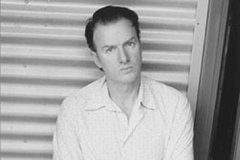Mick Harvey
At ATP's I'll Be Your Mirror London, Mick Harvey presents the music of Serge Gainsbourgh. He is joined by guest vocalist Sophia Brous.
When you leave, when you're gone, you think about what it means. How it feels, how it is to lose what you want to keep close. When Mick Harvey left the Bad Seeds, he didn't think of Nick, and his band mates. He didn't think of the quarter-century he was putting behind him either. Instead, he thought about all those souls that had departed his world fully; of the lives that had ended; of the things that he really wanted to say – in his own way, in his own words, for the first time.
Sketches From The Book Of The Dead is Mick Harvey's first fully self-penned album; a first (and possibly last) step into his own deep, private world.
Harvey has always thought of himself primarily as a collaborator. Outside the Bad Seeds, and his own solo albums, which have predominantly contained interpretations of other people’s songs, he works on projects both low and high profile. On the one hand producing albums by new bands such as The Nearly Brothers, playing concerts and recording with Rowland S. Howard, his old comrade from The Birthday Party and on the other, writing film soundtracks or coming to Britain to record with PJ Harvey on her acclaimed new LP, ‘Let England Shake’.
In early 2007 Harvey had begun writing songs about some of the stories and memories he had of people close to him he had lost. It was just 3 or 4 songs but he knew there was the germ of an idea he cared about in there. Throughout 2009 yet more of Harvey’s old friends and comrades checked out prematurely, culminating with Rowland S. Howard’s demise at the end of the year, and Harvey found himself thinking even more about what it all meant and writing more songs for what was now a fully focused project. He thought about the relationships you still have with people after they are gone. How different experiences bring back different memories and emotions; how scraps of information and feelings are what you take with you, and live with.
In August 2010, after finishing work with Polly Harvey, he returned to Australia. With three empty months ahead of him, he knew it was time to complete the assignment, finish the songs he had started and seal his tributes properly.
The project wasn't about catharsis, he says. Nor was it influenced by the music he had just produced in England, although he saw the odd parallels between his work and Polly's, steeped as it was in ideas of identity and loss. Instead, it was an attempt to write about things that are often left unsaid, a personal endeavour to sketch the faint shapes of lost friends and family. To describe what’s left behind, not what has gone before. It wasn't a compulsion either; unlike other songwriters Harvey has known, he says he is not driven to quench the same demons that they are. But as he wrote, he remembered the great traditions of song stories – in folk music, in the blues, in the dark country of Johnny Cash – and knew that his songs had to carve their own forms. To set out not only the narrative but the experience beyond it, into an amorphous world of what remains after the story - that which lives on within us.
‘October Boy’ tells of a friend “born a little pointed...with a witty tongue”, who “wrenched and tortured” his guitar, and who asked Harvey to write a song for him. ‘The Ballad Of Jay Givens’ describes the chasm caused by missing information and lack of closure - “Jay Givens took a shotgun so his story can’t be told.”.
‘Frankie T and Frankie C’ talks of love turned to tragedy through misfortune and ‘That's All Paul’ of “a stupid, useless end” caused by “a moment's pointless game”; ‘Rhymeless’ sings the songs that parents never sang to their little ones, destined instead to be “ghosts at the end of their beds”.
The whole, however, is shot through with the recognition of our living presence. From the voices of those who are just still with us in ‘Famous Last Words’ through the haunting ‘How Would I Leave You?’ in which the protagonist ponders what will be left behind at his passing. Of not wanting to leave in any season but confidently leaving those behind with the summer's sunshine, the autumn's colours, and the springtime flowers for comfort. A song imbued with the sadness of the inevitable but sending out hope and a wish for the will to carry on.
And then we hear Harvey, alone at last in ‘Two Paintings’ as he visits a house from his past, his car loaded up with the possessions of the former inhabitants -
“There was nothing left to see there”, he sings, “That gave me any sense/Of what once was, so I took your things/Back to the present tense.”
A present tense we all occupy with the memories of those who have departed.
This is an album containing an extraordinary investigation into a rarely scrutinized area of the human condition. Harvey has excelled himself and made a truly unique work to go alongside so much of what he has already achieved in his 30 years of musical creativity.
'Sketches From The Book Of The Dead' will be released 2nd May 2011.
